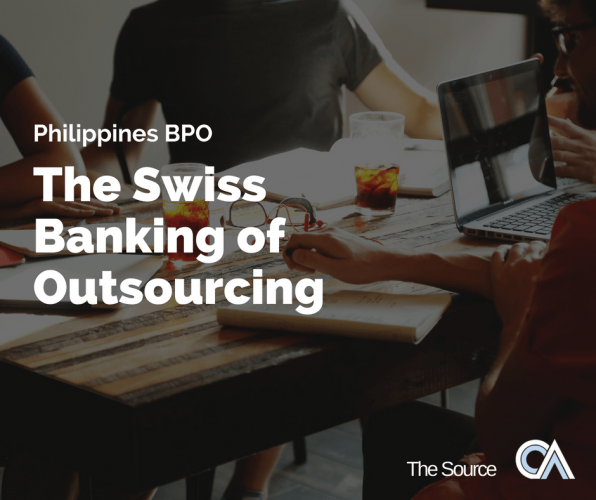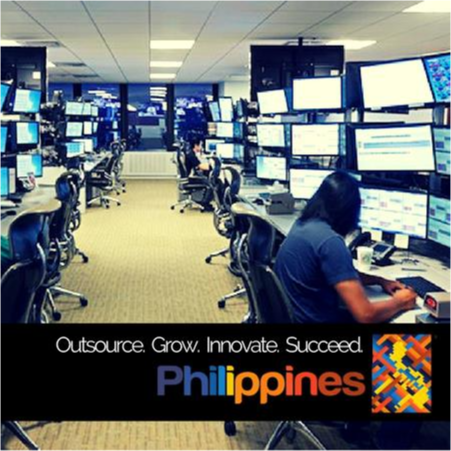Promoting Philippine outsourcing to the world

Preamble
The following paper was originally an internal document for Outsource Accelerator, to give it strategic clarity for its own ambitions and functions. I have now decided to publish this because a lot of the document refers more generally to the promotion and proliferation of Philippines’ outsourcing sector. This paper does reveal some potentially sensitive strategic ambitions of Outsource Accelerator. However, i have decided to publish it in despite of this, because i feel that the promotion of Philippines’ outsourcing should be the priority here. As just one of many players within the outsourcing arena, i think we will all benefit, including the country’s general economic standing, from an enhanced and more successful outsourcing industry.
Because of the informal nature of this originally internally facing document, the opinions offered here are my own, and it’s not 100% fact checked. This paper was originally written June, 2018, and so many of the strategic constituents may have evolved or changed.
Derek Gallimore, Outsource Accelerator
June, 2017
I. Executive summary
Outsourcing is a unique high-value and highly-exportable skillset of the Philippines which contributes a huge amount to the economy and society.
Outsourcing can be better promoted, in a commercially profitable and sustainable way, that can have a huge positive impact on Philippine employment, economic affluence, the wider economy; and generate significant positive foreign renown.
This paper proposes for the government to create an International Business Communication Forum to support the promotion of Philippine’s outsourcing to the world, and building of domestic infrastructure and programs to support Outsourcing proliferation; and support for six key initiatives – as outlined below.
II. Introduction
Outsourcing – a commercial force for good
Business Process Outsourcing (BPO) is a huge contributor to the Philippine economy, with c.10% of GDP, double- digit year-on-year growth and employment of over one million people. The primary contribution is accompanied by countless other positive secondary and tertiary associations.
Outsourcing provides a range of medium-to-high skilled jobs within companies which offer good career ladders and continued professional development. The sector creates a middle class in which the workforce has safe work environments, good medical cover, strong labor laws and happy workplaces. It allows for skilled labor to stay in the Philippines (as opposed to OFWs), with their family, and earn a world-competing salary from their home country. This is a virtuous circle which further strengthens the Philippines and broadens the education levels and skill-base.
However, despite the outsourcing sector contributing c.10% to GDP; it only employs c.1m people – under 1% fo the population. Computer-based and white-collar roles produce high income, but typically require low levels of employment (compared to heavy industry or farming etc.), so there is a need for proactive development of mass- outsourcing activities, so that outsourcing’s employment prospect can trickle down to the masses.
Promotion of a unique asset
Philippine BPO needs promoting – in the same way that the county’s tourism is being promoted. The Philippines needs to invest in, and work to build foreigner’s awareness, familiarity, comfort and confidence in the concept of outsourcing – and with Philippines as their preferred destination.
The Philippines promotes its tourism – as it should. But every country is doing this and every country has beautiful points beaches, scenery, culture etc. – so it is difficult to compete.
However, The Philippines (alongside India) is THE world leader in outsourcing, has been doing it longer than any other country and has more expertise than anyone else, has an almost native-tongue adoption of English, and is closely culturally aligned. This is a unique skill and sector of the Philippines, and thus a rare and unique opportunity for the country, and one that should best capitalized, and promoted accordingly.
Educate about the benefits
The benefits of outsourcing for all ‘Western’ business owners are huge – though most business owners are in fact oblivious. There are millions of successful, profitable SMEs (small-to-medium enterprises) in the Western, high- cost English-speaking world that are commercially astute, but haven’t even considered outsourcing. Many aren’t even aware that outsourcing is ‘out there’, or it just simply isn’t on their ‘radar’.
Previously, outsourcing services were only accessible to multinational conglomerates. But over recent years, service access and provision has been democratized for startups – facilitated by technology and bandwidth advancements and a maturing BPO sector – allowing easy access for SMEs and even.
There are now hundreds of high quality BPO service providers within the Philippines – all eager to cater to the SME market, and are desperate to grow. So, the BPO capacity, means and supply is present, and we now only need to get the word out there, and tell the world about this incredible opportunity.
Supported by an imperative drive for efficiency
It’s imperative for businesses in the West to seek out the most efficient means of carrying out their business.
If they don’t, then competition will provide better cheaper output, and the company will fail. Warren buffet states that any commercial entity, by definition, is obliged to seek highest efficiencies possible – seeking “the most output from the least inputs”. He’s also a vocal supporter of Adam Smith – the original economist – who wrote in c.1750 that “progress is most easily achieved by enabling workers to specialize and work primarily in industries that they are most suited for, instead of being limited to locally available opportunities”. As such, the logical conclusion is that all business owners should outsource, or at least properly consider it.
Technology advancement facilitates easy-outsourcing, and its eventual proliferation and broad adoption is frankly, inevitable. People are hesitant and resisting outsourcing, as the Luddite’s resisted mechanical textile mills in 1811 – but eventually, and of course, efficiency and progress is inevitable. This evolution is playing into the hands of the Philippines and the outsourcing sector.
Long sales cycle with many hurdles
The sales cycle of outsourcing is a B2B (business to business) exercise – however, this is no reason for the promotion and messaging around outsourcing to be cerebral and boring. The sales cycle is long and delicate, because once a decision is made, it is a long, sticky and expensive commitment for the client.
Despite this complexity, the sector is generally approaching its sales and marketing without any great sophistication.
The owners and decision makers of SMEs are people too, so they should be ‘pitched’ as a person, and connected with on a personal and emotional level. For successful promotion of outsourcing, we need to bridge the knowledge gap, present the “why”, and allay their concerns for uncertainty, cultural differences and geographical distance.
Providing potential clients with a set of information- and education-based stepping-stones will accelerate the sales cycle, ease the process, and increase conversions.
III. Sector considerations
Some considerations when promoting the BPO sector:
BPO sector is evolving
The BPO sector initially served huge multinational conglomerates. The growth in this sector has matured, and growth has stagnated. The growth (thanks to technological advancements, cheaper telephone and internet, and an enhanced BPO offering), is now within the SME market.
There are over 35 million SMEs in the western world, employing 102m people, and producing revenues of over 12 trillion USD. If 25% of SMEs employed just one Filipino worker in their team, it would provide 25 million well paid, highly skilled jobs. If 1% of SMEs employed three Filipino staff, it would provide over 1 million jobs. The potential is huge.
Requirement for escalating skill-sets
There is a need for outsourcing to keep up with the times – which it is. But, it needs to be proactively developed, and then promoted as a higher skill offering. The Philippines BPO sector needs to move away from its historic tele- sales and customer support services; up the food chain to IT, professional services, IP, and innovation etc.
The West will see more value in this; the Philippines can continue to upskill and stay relevant; and it will protect the industry from aggressive erosion from Artificial Intelligence (AI) etc. It is essential that the West sees outsourcing as a value-add offering, not just a back-up or back-office solution.
Opportunity for enhanced Philippines employment market
- A burgeoning outsourcing sector would generate untold benefits for the Philippines outsourcing market. Outsourcing will provide
- millions more well-paid skilled jobs
- more white-collar jobs, good income, safe conditions, and a career ladder
- continuing education for the communities and country
- opportunity to push well-paid jobs out into the provinces (most outsourcing can be location-independent
- can move Philippines into a high-skilled professional services nation
- keep the country’s high-skilled employees at home, within their communities (reversing OFW trends)
The Philippines’ finest export
Outsourcing should be regarded as the Philippines finest export. It is also a uniquely distributed export – one that’s protected from all the usual transport, and duty/tariff considerations.
Unlike physical product exports, due to the nature of the service (and internet delivery) of this product, it is very hard for the world to pose trade restrictions, taxation, and regulations on the ‘importing’ of outsourcing services.
Outsourcing is basically a proxy for sending migrational workers overseas, to work for a foreign wage – without the need to physically send them there, and in the meantime sidestepping any migrational border politics.
Imagine if 30 million Filipinos were eventually hired by Western countries – in effect “working in the West” and earning Western salaries – but sitting in their provincial homes, and paying taxes to Philippines. Equally, this selling of service based products is rarely clipped for taxes or import duties etc.
The immediate potential for this is huge, and should be taken advantage of.
Existing bodies – not suited for modern requirements
Outsourcing is so critical to the Philippines, and is a unique specialty of the nation. As a result, the sector needs a modern ‘platform’ that specifically promotes this sector to the world.
There are existing BPO industry associations such as iBPAP, ITC, CCAP and HIMOAP. However, these are all internally facing industry associations and aren’t effectively outwardly promoting outsourcing to the world. IBPAP is possibly now a little old, and irrelevant. It appears to be overly concerned with ‘internal regulation’, enterprise level assistance and market analysis.
The future platform requires a client (not supplier) focus, and a modern interface in which service providers can be aggregated, reviewed and distributed. The primary target audience would be the SME market, as this is where the growth is.
A gap in the market for an outsourcing platform
The world has moved on. Now, sectors and industries are aggregated, promoted and distributed through online
portals, marketplaces and hubs. There is a need and/or opening, for the Philippines’s $30bn outsourcing industry, to have an aggregated marketplace. There is a gap in the market for a trusted outsourcing resource, connector and even review site – think TripAdvisor, meets Agoda.com for outsourcing.
A win-win message
To reduce friction when promoting outsourcing internationally, it is essential that there is a convincing
accompanying message that outsourcing is a “win-win for all involved”. People in the West have a fear of losing their own jobs to outsourcing. Donald Trump is politically exploiting this emotive topic. There needs to be a strong message, in response, that outsourcing is a win-win for all stakeholders – this is a message which can be commercially and academically proven.
Outsource Accelerator has commissioned an academic white paper on this topic now, but there is already a lot of academic research supporting the benefits of both manufacturing and service sector outsourcing.
Market and promote this unique offering
Philippines outsourcing should be promoted! It is a unique offering in which the Philippines is a world expert, with over 25 years’ experience. The Philippines should be acknowledged and renowned as the ‘Swiss Banking of Outsourcing’. See below.
There is currently some negative PR and uncertainty with certain aspects of the Philippine nation. The foreign corporate world gets easily spooked, which has resulted in a recent guarded confidence. A positive corporate (BPO) message about the Philippines – as outlined in this document – would successfully counter these concerns, without (needing to) attend to them directly. This “outsourcing advantage” message needs to closely accompany the win-win message.
III. Proposed initiatives
The overseas yarget audience
The size of the sector, the potential of the sector, the positive employment and economic benefits of the sector justify a concerted effort from the Philippines (both public and private) to reach out to the foreign communities, where the business owners are sitting. The proposed target audience is:
- Geography: The high-cost English-speaking countries (UK, Ireland, US, Canada, Australia, New Zealand, Scandinavia).
- Business sector: SMEs with 2-200 employees.
- Sales cycle position: Top end of the outsourcing engagement ‘sales funnel’ where people have little or no awareness or interest in outsourcing – yet.
The local target audience
There is also an opportunity to garner popular support for outsourcing from the Philippine population.
Outsourcing should be heralded as a fantastic opportunity for the country, and BPO workers should be hailed as ‘economic heroes’.
There should be an effort to aggregate the outsourcing communities. The government can be closely associated with this, and any growth of the outsourcing sector, and enhancement of the economy, can be attributed to proactive government support and action.
Private project – Government support
It is great – and essential – to have government support, but the best approach for most sustainable and
commercially effective platforms, is to have a private – and profitable – company to manage the platform on which the Philippine outsourcing sector will be aggregated, promoted and distributed.
Outsourcing initiatives
This document proposes two primary, and four secondary initiatives, as tabled below:
Primary initiatives:
- d
- Information hub – and media company
- Building provincial employment: 100×100 CPO
Secondary initiatives:
- Promotion & marketing of the sector
- Supported outreach business roadshows
- BPO Champions – building a community
- BPO broker alliance
IV. Primary initiatives
There are two primary initiatives
1. BPO aggregation platform
As identified, there is firm justification for a promotional body for outsourcing; but the world also needs a functional ‘platform’ which makes familiarization and engagement with outsourcing easy.
In the same respect that Agoda makes booking hotels easy; TripAdvisor makes restaurant research easy, and Uber makes taxi bookings easy – outsourcing needs a consumer-friendly information and engagement hub.
The foundational strategy for the promotion and proliferation of the outsourcing sector is the development of a web based information hub for the sector. This hub is designed to become the singular point of authority for the outsourcing sector. It is designed to target and be most relevant to prospective SME clients.
There are two phases to the building of this outsourcing hub:
Phase 1:
Initially the hub is built to provide vast amount of invaluable information. The hub will become the central resource for people considering outsourcing to the Philippines.
The site is monetized (and self-sustainable) via paid consultation products. These products provide prospective clients with invaluable independent guidance which helps them along their outsourcing journey.
This site is already active. It has over 1,000 articles, including 600 BPO reviews, 200+ ‘newshub’ sector articles, and a range of guides and e-books. The site also offers a podcast, and Facebook communities etc. Traffic is being driven to the site now.
Once the foundational authority has been built, then eventually this site can move to Phase 2.
Phase 2:
Phase two of the program shifts the hub into an aggregated marketplace (platform) of outsourced services. It will transition into a TripAdvisor/Agoda type aggregator of services.
It will play a dual role in attracting potential clients, and providing an easier platform for people to engage with outsourcing, and it will also provide an easier interface for outsource service providers to meet, engage and convert interested clients.
This is a primary initiative of outsourcing promotion, however, it doesn’t directly need much support or funding (the website is self-funded, self-sustainable and profitable).
The early-stage hub is in essence a media platform. SO in this respect, any access to media resources – such as newspapers, radio, TV would be highly advantageous (and cost-effective) for the cause.
The main support for this platform is created via the secondary initiatives as discussed below.
2. 100 X100 CPO program
There is a fantastic opportunity to take outsourcing’s employment potential out into the community, and deep into the provinces.
We propose a provincial outsourcing employment plan – referred to as: 100×100 CPO (Community Process Outsourcing). This plan proposes:
- 100 provincial towns to receive CPOs
- 100 employees in each BPO
- 10,000 jobs created
- 1,000 days to implement
- Development of a profitable, self-sustainable community-based enterprise
Note: the term ‘CPO’ is a play on the BPO term. It refers to these BPOs being a community-based and self-managed organisaiton, hence Community Process Outsource (CPO).
This 100×100 CPO plan would create 10,000 jobs where they are most needed. It would take skilled job opportunities deep into the provinces.
The only requirement is that the community has a reasonable internet connection, and a basic ‘internet café’ type facility provided. There would be capital requirements to set this up, but the requirement would be relatively minimal compared to any other development which would provide 100 jobs in each location. There are a many ways to fund and develop these CPO facilities – they can potentially be done very cheaply, and can also attract private-sector partnerships, and even, sponsorship.
Each CPO facility would be profit-generating and a self-sustainable exercise. Once the seed of this plan has been sewn into the communities, it is likely that private-sector opportunists would even emulate this model, which would mean a further proliferation of community CPOs, which would add even more jobs.
This would be a community led program needing minimal staffing, and minimal setup costs. The program would provide on-the-job training, quality control and employment opportunity.
Outsource Accelerator has a full outline of the 100×100 CPO plan for further consideration.
V. Secondary initiatives
There are four secondary initiatives:
1. Promotions and marketing
The outsourcing sector deserves a budget for promotion and marketing. It is the county’s highest value, and most unique export. A well-orchestrated marketing campaign focused on foreign SMEs, could be a big boon for the government. It could be a good-news story, and if executed to a level of success anywhere near the “more fun the Philippines’ campaign, it could generate a vast number of jobs.
The messages
The core messages (and value propositions) to the business owners should be:
Message 1:
- You can save 70% on staffing costs by outsourcing to Philippines
- This is a compelling message, and for a business owner, it is hard to not at least consider. Consider that a small SME employing just 10 people will be spending c. USD50,000 per month on salaries – they could save $30,000 per month…
Message 2:
- It isn’t just about saving money. Outsourcing is about driving growth and innovation through easy access to better abundant more economic human resource
- This affirms the value-add capabilities of Philippine’s BPO
Message 3:
- Philippines is the “Swiss Banking” of Outsourcing
- If you want the best fashion, you go to Italy; if you want the best banking, you go to Switzerland; and Silicon Valley offers the best tech scene. If you want the best outsourcing, you go to the Philippines. Philippines deserves, and should claim, the renown of the Word’s highest quality outsourcing destination.
Message 4:
- Outsourcing is a win-win
- An important message which affirms, “we come in peace”, is important; and it affirms that the Philippines is willing “to be your value-add partner”
Message 5:
- Outsourcing is easy – take action now
- Provide people with familiarity and comfort around the sector, and give them easy access points to ‘try it’.
The Slogan
The tourism slogan “It’s More Fun In The Philippines” has created a huge amount of familiarity and enthusiasm for the Philippines. It is without doubt, a huge success. There needs to be a similar campaign and slogan for outsourcing. Here’s an example: Outsource. Grow. Innovate. Succeed. Philippines.
There can also be a slogan relating to: “Philippines, the Swiss banking of outsorucing”
These messages should be taken to the business world out there. If this campaign has as much success as the tourism campaign, I would like the suggest that the net benefit to the Philippines economy could be ten-times greater than the gain from the “more fun in Philippines” marketing .
2. Supported outreach and roadshows
The Philippines should jump on the opportunity to promote outsourcing to the world. Business outreach programs would be highly cost effective and have huge impact. This could be a series of co-sponsored events between government agencies and private outsourcing service providers.
Example outreach:
- Digital webinars to business groups
- Physical meetups exploring business and outsourcing opportunities
- Trade shows and diplomatic visits
These outreach projects should be supported by all relevant Philippine government and non-government business agencies.
Examples are PCOO, foreign trade commissions, embassies chambers of commerce, OFW support networks etc. This promotion would be supported by the above marketing efforts, materials, and slogans.
The content and materials for these meetings and educational forums already exist.
3. BPO champions – building a community
There is a very strong and proud OFW community and network. Filipinos general have a very strong community and culture of support – especially when in, and faced by the outside world.
The outsourcing sector has many strands of commonality, which forms the basis for a strong community identity, yet there is no aggregated community to speak of.
A community should be built for outsourcing.
Outsourcing should be heralded as a modern white-collar technological solution to the Philippines’ poverty- beating economic ambitions. Outsourcing should be celebrated as a medium which brings the country vast skilled jobs, and one that allows the country to shine on a world stage.
The employees of outsourcing should be heralded as heroes of the new modern Philippines. ‘These young people will pull Philippines from poverty and lead the charge towards an affluent and successful 22nd century’.
There are many ways to seed and nurture this community. Low cost Radio, TV, Facebook streaming, Facebook groups, and popular media can all access and build these communities.
Having a united and aggregated BPO workforce will allow the Philippines to spread good word of the latest developments and will facilitate easy mobilization and virality in support of the greater economic cause. This will all reflect very positively on the government.
4. BPO broker alliance
Outsource Accelerator has a training program which propagates an army of independent outsourcing (BPO) brokers. These BPO brokers are based overseas, in the home-towns and communities of “Western SMEs”, and then promote, and sell, outsourcing to these SMEs in their community.
The brokers are educated about the benefits of outsourcing, and they’re provided with a tool kit which allows them to do needs analysis of companies, educate and prescribe outsourcing solutions, and sell outsourcing services, and assist with integration.
This decentralized approach creates an army of self-motivated and self-funding outsourcing evangelists to be embedded in the overseas communities in which outsourcing can best serve.
Outsource Accelerator provides a unique preparation course for would-be BPO brokers. This short course provides them with all the resources they need to start a sustainable business of their own. Alongside education and assessment tools, Outsource Accelerator provides a platform of BPO service providers, with set fee and commission structures. This BPO platform provides the brokers with an opportunity to earn good commission- based income for their outsourcing promotional efforts.
Having a network of potentially hundreds of overseas community-based BPO brokers can have a huge impact on promoting both the concept of outsourcing, and all the positive attributes of the Philippines.
VI. Outsource Accelerator
Outsource Accelerator is fast becoming the world’s foremost authority on outsourcing to the Philippines, for SMEs.
Like Agoda (hotel aggregator), TripAdvisor (holiday reviews), and Airbnb (people’s houses), the solution to promotion of a sector and aggregation and simplification of the interface and understanding of the public is through:
- A simple interface
- Available free independent information
- Easy stepping stones to take action and get started
Outsource Accelerator offers abundant free information promoting outsourcing, and business in the Philippines.
It offers 1000+ articles, including a News Hub, blog articles, and guides. It offers outsourcing blueprint, e-books, and podcasts (3 episodes per week) offering interviews and advice and insight – plus building Facebook communities and video content and education.
Outsource Accelerator is a self-sustainable for-profit organisaiton, but it has a great win-win mission and message. The company monetizes its efforts, via consulting packages. The primary consultation pack is a mass market pre- packaged product so that it is highly affordable to individuals and accessible to the masses – and is highly scalable to produce.
VII. Summary
Promoting outsourcing to the world is offers huge opportunity for the Philippines, its people, and government. The primary approach is through promotion, but this needs to be executed using a modern platform-based approach – as discussed above.
Thus, I propose that an International Business Communication Forum is created to establish efficient and effective means of taking Philippines’ outsourcing to the world, and building a strong economic future for the Philippines.
The Communication Forum would seek ways to best support the six proposed initiatives outlined above.












 Independent
Independent




